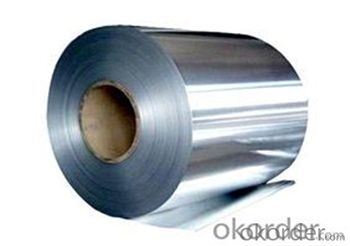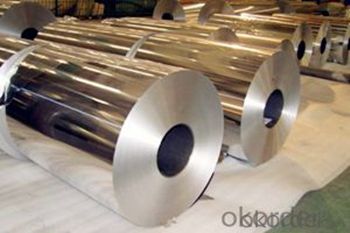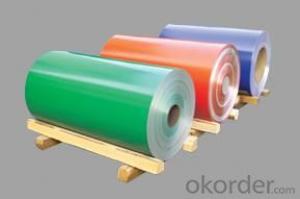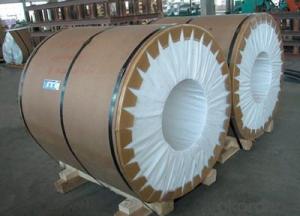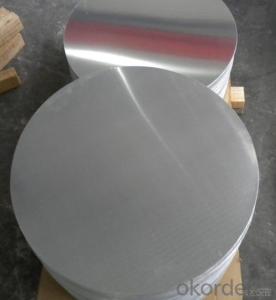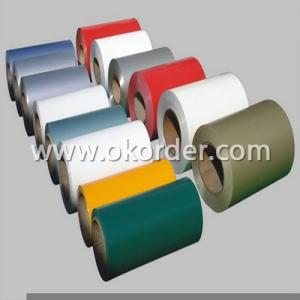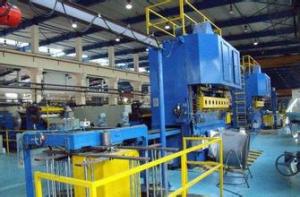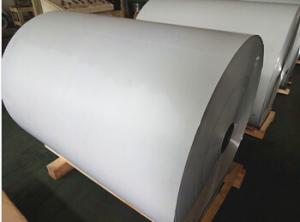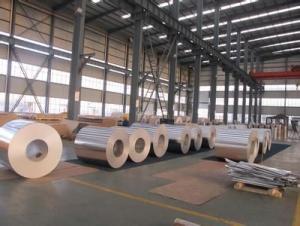High Quality Copper Aluminum Coil with a Good Price
- Loading Port:
- Qingdao
- Payment Terms:
- TT OR LC
- Min Order Qty:
- 10000 kg
- Supply Capability:
- 100000 kg/month
OKorder Service Pledge
OKorder Financial Service
You Might Also Like
Specification
Aluminum Coil
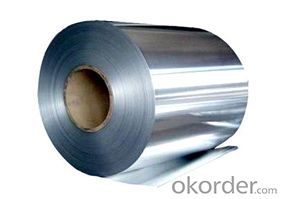
Product Description of Aluminum Coil
Aluminum ingots can be rolled to form aluminum coil end product. The aluminum coil is slit into desired width of aluminum sheet, aluminum strip by slitting cutter.
Classification of Aluminum Coil
The aluminum strip is the ribbon and it is made by the rolled aluminum ingots. Aluminum strip can be divided into various brands, specifications and states based on the different usages. The common brands are 1050, 1060, 1100, 3003, 8011 etc. There are two states exist, usually, we use O means soft state and H shows hard state, the numbers often follow after O and H to represent the degree of hardness and anneal.
Aluminum Coil Picture
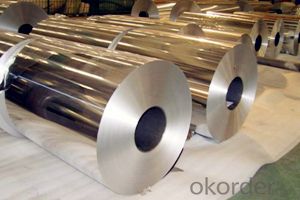
Application of Aluminum Coil
Aluminum strip can be widely used for aluminous-plastic composite pipe, cable, fiber optic cable, transformer, heater, window-blinds etc. Gongyi Aluminum Co.,Ltd. mainly produces aluminum strip for pipe and cable.
Introduction of our company
Our company is a professional Aluminium Strip manufacturer and Aluminum Circles manufacturers,mainly supply Aluminium Coil,Aluminum Circles,Aluminium discs,Aluminum Sheet,Aluminum Strip, Household Aluminum Foil,Aluminum Foil for Pharmaceutical Packaging,Aluminum Foil Tape,Aluminum Foil for Air Conditioner,Aluminum Foil for Container etc. series of aluminum products, sincerely welcome everyone to visit.
- Q: Can aluminum coils be used in food processing industries?
- Yes, aluminum coils can be used in food processing industries. Aluminum is non-toxic, lightweight, and has excellent conductivity, making it suitable for various applications in the food industry. It is commonly used in food packaging, cooking utensils, and equipment, including heat exchangers and refrigeration units. Additionally, aluminum coils are corrosion-resistant and easy to clean, making them a safe and hygienic choice for food processing.
- Q: What are the transportation and storage requirements for aluminum coils?
- The transportation and storage requirements for aluminum coils involve careful handling and protection. During transportation, coils should be securely strapped or loaded onto pallets to prevent damage or shifting. They should be transported using appropriate equipment, such as flatbed trucks, to avoid bending or distorting the coils. Additionally, coils should be stored in a clean, dry, and well-ventilated area to prevent corrosion. They should be stored horizontally, with proper support to avoid any deformation. Proper labeling and documentation are also necessary for tracking and identification purposes.
- Q: What is the difference between hot-rolled and cold-rolled aluminum coils?
- The manufacturing process and resulting properties of the finished product differentiate hot-rolled and cold-rolled aluminum coils. Hot-rolled coils are made by subjecting aluminum ingots to high temperatures and passing them through rollers to achieve the desired thickness and shape. This process enhances the aluminum's malleability and allows for greater flexibility in terms of size and shape. Hot-rolled coils are generally larger and have a rougher surface finish compared to cold-rolled coils. In contrast, cold-rolled coils are produced by cooling down the hot-rolled coils and passing them through rollers at room temperature. This not only reduces the thickness of the aluminum but also improves its surface finish, resulting in a smoother and more pleasing appearance. Cold-rolled coils are typically thinner and have a more consistent thickness compared to their hot-rolled counterparts. The differences in the manufacturing process and surface finish of these two types of coils lead to distinct mechanical properties. Hot-rolled coils are generally weaker and have lower tensile strength when compared to cold-rolled coils. However, they are more ductile and can be easily formed and shaped without cracking. On the other hand, cold-rolled coils possess higher tensile strength and are better suited for applications that require increased strength and durability. To summarize, hot-rolled aluminum coils are larger, have a rougher surface finish, and are more malleable. In contrast, cold-rolled aluminum coils are thinner, have a smoother surface finish, and are stronger. The choice between hot-rolled and cold-rolled coils depends on the specific requirements of the application, such as strength, surface finish, and formability.
- Q: What are the necessary safety measures to take when handling aluminum oxide coated aluminum coils?
- <p>When working with aluminum oxide coating on aluminum coils, it's crucial to follow safety precautions. Always wear appropriate personal protective equipment (PPE), including gloves, safety glasses, and a dust mask to prevent inhalation of dust particles. Ensure proper ventilation to avoid dust accumulation. Handle the material carefully to prevent any skin contact with the coating. Keep the area clean and free from any flammable materials to avoid fire hazards. Be aware of the specific health risks associated with aluminum oxide exposure, and follow the manufacturer's guidelines for safe handling. Regularly inspect equipment for any signs of wear or damage that could lead to accidents.</p>
- Q: What is the maximum coil diameter for aluminum coils?
- The specific application and manufacturing process can cause variation in the maximum coil diameter for aluminum coils. Generally, aluminum coils have a maximum diameter ranging from 60 inches (152.4 cm) to 120 inches (304.8 cm). Factors like production equipment size, aluminum sheet thickness and width, and facility handling capabilities determine this diameter limit. To ascertain the specific maximum coil diameter for a particular aluminum coil product, it is essential to consult the manufacturer or supplier.
- Q: Is it safe and effective to use aluminum coil for baking purposes?
- <p>Yes, aluminum coil can be used for baking. It is a common material in baking due to its excellent heat conductivity, which allows for even heating and browning of baked goods. However, it's important to ensure that the aluminum coil is food-grade and clean to avoid any contamination. Additionally, some people may be concerned about potential health risks associated with aluminum, although these concerns are generally considered minimal when using aluminum cookware for baking.</p>
- Q: Can aluminum coils be used in the production of aircraft fuel tanks?
- Yes, aluminum coils can be used in the production of aircraft fuel tanks. Aluminum is a commonly used material in the aerospace industry due to its lightweight, strong, and corrosion-resistant properties. It is an ideal choice for fuel tanks as it can effectively withstand the harsh conditions and requirements of aircraft operations.
- Q: This question asks for methods to assess the quality of aluminum coils.
- <p>To determine the quality of aluminum coils, consider several factors: purity and alloy composition, which affects strength and corrosion resistance; surface condition, checking for scratches, dents, or impurities that can affect performance; mechanical properties like tensile strength and elongation; and dimensional accuracy, including thickness, width, and straightness. Conduct tests such as hardness tests, tensile tests, and corrosion resistance tests. Visual inspection and using measuring tools for dimensional checks are also crucial. Compliance with industry standards and certifications from recognized bodies can also indicate quality.</p>
- Q: Are aluminum coils more expensive than other coil materials?
- Yes, aluminum coils are generally more expensive than other coil materials. This is mainly due to the higher cost of producing aluminum compared to other metals, such as copper or steel. Additionally, aluminum coils are known for their superior corrosion resistance, lightweight nature, and high thermal conductivity, which further contribute to their higher price point. However, it's worth noting that the cost can vary depending on factors such as the thickness, size, and specific application of the coil.
- Q: How do aluminum coils compare to stainless steel coils in terms of durability?
- Aluminum coils and stainless steel coils differ in terms of durability. Generally, stainless steel coils are considered to be more durable compared to aluminum coils. This is primarily because stainless steel is known for its corrosion resistance and longevity. Stainless steel has a higher resistance to corrosion, making it suitable for use in harsh environments or applications where there is exposure to moisture, chemicals, or high temperatures. It is less likely to rust or develop corrosion spots, ensuring a longer lifespan and maintaining its structural integrity over time. On the other hand, aluminum coils are more susceptible to corrosion, especially in environments with high humidity, saltwater, or acidic conditions. Aluminum coils are often coated or treated to enhance their corrosion resistance. However, even with these measures, they may still be prone to corrosion over time, which can compromise their durability. That being said, the durability of both aluminum and stainless steel coils can also depend on other factors such as the quality of the materials, the manufacturing process, and the maintenance and care provided. Regular cleaning, proper storage, and preventative measures can help extend the lifespan of both types of coils. In summary, while both aluminum and stainless steel coils have their own advantages and disadvantages, stainless steel coils generally offer superior durability due to their higher resistance to corrosion. However, the specific application, environment, and maintenance practices should also be taken into consideration when determining the most suitable option for a particular situation.
Send your message to us
High Quality Copper Aluminum Coil with a Good Price
- Loading Port:
- Qingdao
- Payment Terms:
- TT OR LC
- Min Order Qty:
- 10000 kg
- Supply Capability:
- 100000 kg/month
OKorder Service Pledge
OKorder Financial Service
Similar products
Hot products
Hot Searches
Related keywords


